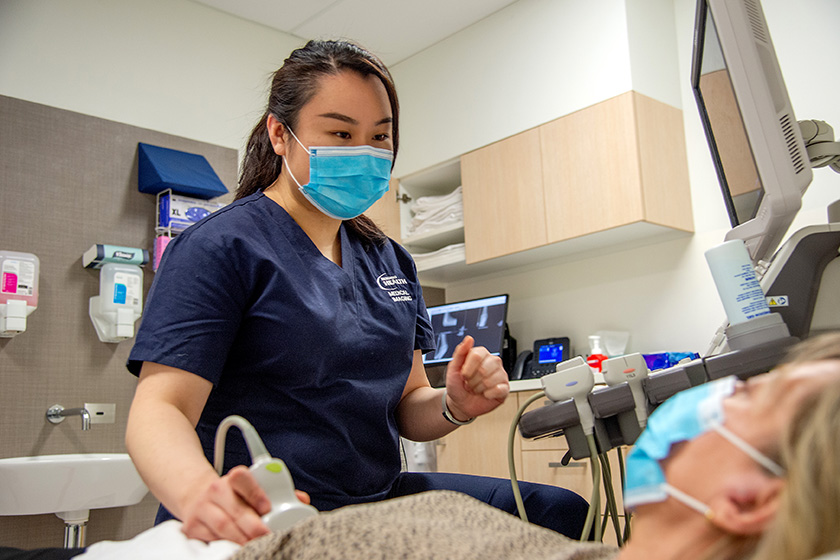
Sonographers are in short supply nation-wide, so as a longer-term solution Bendigo Health offers a traineeship, a highly-competitive opportunity which radiographer Wendy Wang from Sydney jumped at.
“I was attracted to the hospital environment, working with all the teams and diversity in terms of patients and needs. So far it has exceeded my expectations,” Wendy said.
Director of Medical Imaging Resa Barker said: “What we can offer from a training perspective compared to what some of the metropolitan hospitals can is quite different. For example our new graduates are often rostered in computerized tomography (CT) within the first couple of months. If you are working in a big metropolitan hospital it can be 12 months or longer before you might be rostered to CT. The supply of radiographers in metro areas makes training opportunities much more competitive.”
Wendy’s pathway to becoming a Sonographer is quite intensive and requires another two years of part-time study as a Postgraduate at Monash University and 2200 hours working full-time in the hospital.
As Resa points out: “There is the time commitment from existing staff to support trainees, so COVID stopped a lot of workplaces training just like many disciplines. But there is also the demand for ultrasound continuing to increase - combined with an aging workforce that just can’t keep up. These factors have contributed to the national shortage and Bendigo Health’s focus on training and development to help meet demand and grow the services within the hospital.”
The big picture
The ultrasound department provides ultrasound scans for obstetric, and oncology patients, provides breast, vascular and general imaging; which can include anything from imaging livers and kidneys in ICU to checking for gallstones, appendicitis and muscle tears in patients from the emergency department. Ultrasound also guides procedures such as biopsies of possible cancers, to draining abnormal fluid collections.
“It’s a very heavily used service in the hospital and the community,” Resa said.
Wendy said: “What we are talking about is how we can take photos or images essentially of the human body to help doctors differentiate in a diagnosis, and we play a pivotal role in that diagnosis.”
“I’ve always enjoyed the field of Western medicine and the human body, and using the most cutting edge technology to provide that service to play a role in helping a person."
Relocating from Sydney to rural Victoria was an easy decision for Wendy. “I wanted to move away from my comfort zone. For me, moving out from the family home builds innate confidence into your character, and you realise that you have a greater sense of purpose when you have that complete control over your own life,” she said.
“I really had to reflect on what I have joy and purpose in, and so it makes my whole routine more focused and cater to what I really want to do. And you can do some more self-discovery over time and I’m sure you will grow over time as well, and discover new hobbies.
“Career plays a big part of course but for me, moving to a new location in the region - it’s a good opportunity to explore and be that person you want to be.”